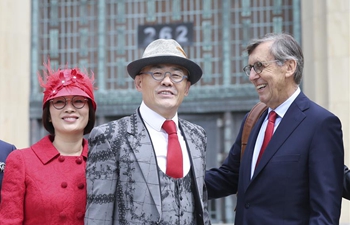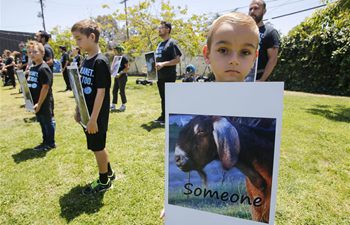by Julia Pierrepont III, Gao Shan
LOS ANGELES, June 6 (Xinhua) -- Academy Award-winning documentarian, Vanessa Roth, is known for unflinchingly tackling weighty subjects such as the plight of the young girls of India's "Untouchable" cast in Netflix' "Daughter's of Destiny," or "Aging Out" on the U.S. foster care system, or her Academy Award-winning short, "Freeheld," on same sex marriage.
In "The Girl and the Picture," Roth may have taken on her most challenging subject to date: The Nanjing Massacre. In total, more than 300,000 Chinese people were killed by Japanese invaders during the brutal massacre lasting six weeks in 1937.
With "The Girl and the Picture," Roth has delivered a powerful documentary short about loss, legacy and the power to change the future, told through the eyes of Xia Shuqin, 89, a childhood survivor of the Nanjing Massacre.
At the age of 8, Madam Xia witnessed her family members murdered, and older sisters raped and destroyed before her eyes. Madam Xia and her 4-year-old younger sister were bayonetted and left to die. Xia and her sister managed to survive by hiding amongst the dead bodies of her family for ten whole days before being discovered.
"It was a brutal story that she hadn't talked about until her 60s," revealed Roth in a recent exclusive interview with Xinhua. "Even her own children didn't know what had happened to her."
Xia and her sister were rescued and their plight photographed by Reverend John Magee, an American Episcopal missionary and chairman of Nanjing's local Red Cross. He left the security of the foreigner's Safety Zone to save Chinese civilians and capture photographic evidence of the atrocities the Japanese army were committing to ensure the whole world would know what happened there.
"These amazing people are witnesses to History," observed Roth. "I wanted to explore history from a family perspective. So when the USC Shoah Foundation approached me to make a film about Madam Xia and her family, I realized that history could be told on a more individual level - as a family legacy to be passed down through the generations."
Roth felt the depth of connection between the Xia and Magee families would open up a window into a deeper understanding and more individual perspective on history than a standard interview could.
Working collaboratively, she sat with Madam Xia, Xia's granddaughter, great-grandson (age 7), and Reverend Magee's grandson (age 60) at home to look through photos of the Nanjing massacre and let the family lead the conversation and ask whatever questions mattered to them.
"Madam Xia's young great-grandson asked kid questions, like 'What games did you play?' But he was also naturally curious about her ordeal and asked her if he could see her scars," she added.
"My first instinct is 'Oh, don't show that, it's too graphic!' because we want to protect our kids," Roth revealed. "But his question resulted in a really profound moment that really opened things up."
Madam Xia's granddaughter was also amazed to hear her grandmother's story.
"Many of us look at our grandparents and think, Oh, that's just my grandmother. We forget how much life they lived. For younger generations to get to ask questions of older ones, it opens up a different sense of their grandparents and of themselves," the film's director explained.
Madam Xia's bravery didn't stop with childhood survival. When she began to speak about her ordeal as an adult in her 60s, many in Japan denied her story. What did she do? Madam Xia flew to Japan to confront her naysayers.
Her granddaughter asked her where she got the courage to walk into the lion's den.
Her grandmother replied, "I am a survivor of the Nanjing massacre. I have a right to speak up."
"Xia thought speaking the truth was the most important thing. And I was moved by her bravery," admitted Roth. "She had the courage and fortitude to go to Japan and stand up for herself."
Even today, when Madam Xia speaks about the atrocities, she doesn't hold all of Japan accountable. She feels that something specific happened to her and her family. Horrific acts were done by certain bad individuals, but not everyone in Japan is to blame.
"Our elders have stories to tell and our children have questions to ask," Roth explained. "And those of us in the middle often forget how powerful the bridge between those two generations is."
"There is a legacy to loss and trauma - an inherited loss, yes - but there is also an opportunity for inherited pride as well. I hope that's what happened for Madam Xia's family," Roth said with feeling.
"When I started this project, I knew very little about the Nanjing Massacre and I also found that most Westerners knew little about it," the director revealed. "I think in every country, our view of history tends to be myopic, no matter where you live. That made it more important to make this film."
"It speaks to the bigger questions about the banality of evil. We are complex beings, so when humans commit atrocities and behave as badly as we see in history, we also see the other side - the goodness - that comes out too."
"Like John Magee," she explained, "who stayed in Nanjing at his own risk to save Chinese civilians and document the atrocities being committed there. And the other foreigners in the Safety Zone who protected thousands of Chinese people as well. Good and bad are both part of our human DNA," she concluded. "It comes down to our personal choices. To be responsible. To hold yourself accountable."
Roth hopes her work will help break down more barriers. "One of my goals is to shatter the idea of 'otherness,' so we can learn from each other and practice empathy and compassion." This empathy for others is part of what makes "The Girl and The Picture" relevant today.
"Yes, these are troubling times. But this moment doesn't exist in a vacuum. People have experienced similar times in history and we can ask them about it, and learn from them, as Madam Xia's granddaughter and great-grandson have learned from their grandmother," she told Xinhua.
"What's also important is that when our witnesses to history are gone, it is their children and grandchildren who must carry their stories forward. I want my own kids to grow up to stand for something, not just against something. To ask questions, to be critical thinkers as individuals and people."
She added, "We must learn from the history that came before us, learn from past mistakes. Otherwise history will repeat itself," she warned. "That's how we change the future."
"I have three children and their feedback on the film has been wonderful. They all loved seeing the great grandchild of Xia in the film because they say it shows how curious and interested young people and children can be about their ancestors' lives and how much our elders have to share with kids. So I think it made them all very interested in their own family history - which is what my hope was in making the film," said Roth.
In closing, she concluded, "Madam Xia has passed along what it takes to stand up for oneself... to stand up for history... and to stand up for what's right."













